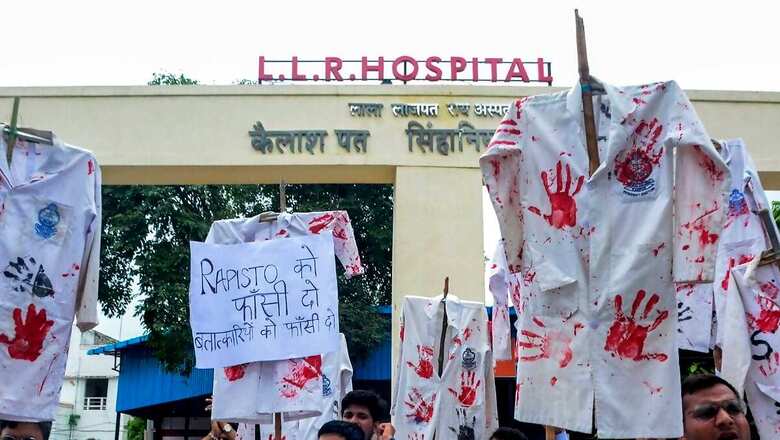
views
The recent case at the RG Kar Medical College and Hospital is a stark reminder of the severity of the issues surrounding women’s safety and the pervasive violence they face, even in environments where they should feel most secure.
A young trainee doctor was raped and murdered within the supposed safety of the hospital premises while resting after long hours of duty. This horrifying crime is not an isolated incident but part of a broader epidemic of violence against women that permeates every aspect of our society. In just one week, the nation has been bombarded with reports of rape, assault, and violence against women, each story more disturbing than the last. These aren’t mere footnotes in the news; they are glaring indictments of a society that has systematically failed half its population.
Violence against women occurs not only in dark alleys but also in workplaces, public spaces, and online. The National Crime Records Bureau’s (NCRB) annual report reveals a harrowing surge in crimes against women in India. With a staggering 445,256 cases registered in 2022 alone—equivalent to nearly 51 FIRs every hour—the data exposes a grim escalation from 2021 and 2020. The rate of crimes against women per lakh population stood at 66.4, while the charge sheeting rate in such cases was logged at 75.8, according to the “Crime in India 2022” report. Of the total registered cases, 18.7 per cent involved assault on women with intent to outrage modesty, and 7.1 per cent were rape cases. Yet, these alarming statistics represent only a fraction of the reality. Countless cases go unreported, silenced by fear, shame, or societal pressure.
What is perhaps more troubling is that these acts of violence are not merely spontaneous outbursts but rather a reflection of the deep-seated inequalities that women face in every aspect of life. When women are reduced to commodities, violence becomes an everyday occurrence. This violence is not limited to physical assault; it extends to economic and emotional abuse, particularly in the workplace, where power dynamics are often skewed against women.
Laws like the Sexual Harassment of Women at Workplace (Prevention, Prohibition and Redressal) Act, 2013, commonly known as the Prevention of Sexual Harassment (PoSH) Act, were designed to protect women, but reality paints a different picture. While the Act mandates the formation of an Internal Complaints Committee (ICC) in every workplace to address complaints of sexual harassment, the structure of these committees is inherently flawed.
Comprising senior employees from the same organisation and an external member, typically from an NGO or similar body, these committees often prioritise protecting the company’s interests over ensuring justice for the victim. The power dynamics at play—where committee members may have vested interests in the company—create an environment that discourages genuine investigation and accountability.
The challenges extend beyond the workplace. The internet, initially intended as a space for connection and opportunity, has become a new battleground for women. The number of cybercrime incidents in 2021 increased by 18.4 per cent compared to 2019, but incidents targeting women rose significantly more, by 28 per cent, according to data released by the National Crime Records Bureau. Of the 52,974 cybercrime incidents reported in 2021, 10,730—20.2 per cent —were cases of crimes against women. From stalking and doxxing to revenge porn and online abuse, the digital realm provides new avenues to perpetuate old forms of violence. The anonymity of the internet emboldens perpetrators, while the lack of stringent cyber laws and the slow pace of legal recourse leave victims vulnerable.
Where do we go from here? The current state of affairs reveals a disturbing disconnect between the laws on paper and their implementation in practice. The NCRB’s 2021 report highlights a 95 per cent pendency rate in rape cases. These figures indicate a system that is not only sluggish but often indifferent to the plight of women. Delays in judicial proceedings, coupled with an unsympathetic administrative system, further discourage victims from coming forward.
The PoSH Act and similar laws, while necessary, are insufficient as they stand. They address harm only after it has occurred and fail to challenge the systemic and gendered nature of work that leaves women vulnerable in the first place. Urgent reform is needed, starting with a re-evaluation of the ICC’s composition to ensure impartiality and fairness. Employers must be held accountable for creating and maintaining a safe working environment, with stringent penalties for failure to do so.
This is not just a legal failure but a societal one. Women are often shackled to lives of silent suffering, fighting not only for equality but for basic dignity. The fear of retaliation, job loss, and character assassination silences many, allowing a culture of impunity to thrive. It is a vicious cycle where power dynamics are exploited, and the victim is frequently left with no recourse.
While legal protections and growing awareness represent progress, the numbers tell a different story—a story of systemic failure, where laws exist more in theory than in practice, and a society that continues to devalue women at every turn.
We cannot afford to let these stories fade into the background. They demand our attention, our outrage, and, most importantly, our action. The time for change is long overdue.
The author is Rajya Sabha MP, and National General Secretary, YSR Congress Party. Views expressed in the above piece are personal and solely those of the author. They do not necessarily reflect News18’s views.




















Comments
0 comment